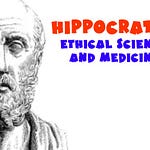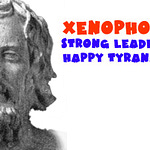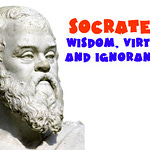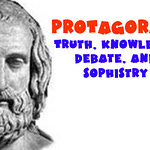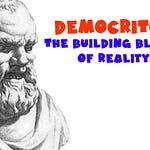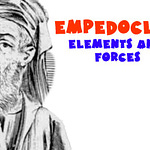Paid subscribers will have access to this and all other videos and bonus content. Please consider upgrading to a paid subscription to enjoy and support this project.
You can also obtain the benefits of a paid subscription by sharing Three Minute Philosophy with others. For each new friend you bring in, you earn benefits. So spread the word!
For the full archive of videos so far, visit https://www.speterdavis.com/philosophy/
The Eleatic school refers to a group of philosophers who lived between 400-500 BC in the city of Elea in what is now modern day Italy. They were Parmenides, Zeno, and Melissus.
Much like the Ionians they were also concerned with the metaphysics of the world and what everything was made of, but unlike the Ionians they weren’t identifying one particular type of material like water or air and saying yeah, everything’s just a version of that stuff.
The Eleatics did believe that everything was made of the same stuff but their understanding was actually closer to what we now know to be true, which is that the stuff everything is made of is just that – the stuff. You know, matter.
Beginning with Parmenides, the Eleatics took a different approach from their predecessors to figuring out the nature of the world using logic and reasoning instead of pure observation. This is important because it signified the moment that philosophy became truly sophisticated as a discipline rather than just kind of looking at things really hard and describing them.
Parmenides thought that the question of what everything is made of is kind of a silly thing to ask because in order to describe anything you kind of need to have something to compare it against But everything is, well, everything. To say for example that everything is made of water like Thales didn’t make any sense to Parmenides because in order to define water you need compare it to something that isn’t water.
If there is nothing that isn’t water then what use is the word “water?”
Parmenides therefore was the first true proponent of substance monism, which is the principle that there is fundamentally only one type of thing. Even though some things might look different to other things, on the most basic level they’re really just all the same thing.
But Parmenides insistence on Monism took him to some pretty radical places, for example his idea that there’s no such thing as “nothing.” That might sound like a reasonable statement, self-evident even, that things that don’t exist don’t exist, but Parmenides’ radical notion was that this means motion and change are all illusions.
If “nothing” doesn’t exist then there’s no place in the universe that’s empty because even space is still stuff, and all stuff is the same stuff, so all of reality is kind of just one big solid block of stuff.
And since it doesn’t make a lot of sense to say that stuff is moving through itself, there really isn’t any such thing as movement, and without movement there’s also no change. After all, how can anything change if it can only change into itself?
It’s easy to say that the best rebuttal to all of this is your eyes, but the Eleatics were extremely emphatic about it.
Parmenides’ apprentice Zeno is most famous for illustrating the Eleatic philosophy using paradoxes. These are thought experiments that showed how logical reasoning often contradicts observed reality. You could tell what about the world was an illusion by what parts didn’t make any logical sense, and what Zeno was concerned with mostly was trying to prove that movement isn’t real.
Zeno’s most famous paradox was a footrace between Achilles and the tortoise. In this story, the fastest man to ever live, Achilles, or the Flash if you prefer a modern interpretation, runs to catch up with a tortoise that’s very slowly racing ahead of him.
But no matter how fast Achilles runs, by the time he gets to where the tortoise was, the tortoise has also moved and is now in a new spot. This remains the case no matter how close Achilles gets, if the tortoise never stops moving then the point where Achilles is and the point where the tortoise is can never be the same point. Achilles can only ever gain on the tortoise but never catch it.
You might recognize this as being very similar to Aesop’s fable about the hare and the tortoise, although the point of the story is different in each case it’s still interesting how many ancient Greek analogies express frustration about being unable to outrun a turtle.
Another puzzle Zeno came up with was called the dichotomy paradox. If you imagine for the sake of argument that you’re trying to get from one side of a tennis court to the other. Of course they didn’t have tennis courts in ancient Elea but then again they didn’t have the Flash either so you’ll just have to deal with my simplifications for illustrative purposes.
Before you can get to the other side of the court you have to first get half way but before you can get half way you first have to get a quarter of the way, but before that an eighth of the way. Zeno’s point was that any journey you make requires you to travel to an infinite number of destinations, which is impossible, so movement is impossible.
Finally there’s the paradox of the arrow, which Zeno thought disproved the notions of both movement and time. If you imagine an arrow flying through the air and you take a snapshot of it at one moment and another snapshot at the very next moment. Yes I know they didn’t have cameras either. Illustrative purposes.
In order for the arrow to be moving it must be in a different place from one moment to the next. But how does it get there, does it teleport? No matter how fast the shutter speed is on your camera, it still seems like the arrow needs to leap over some distance when we know full well that it can’t.
Once again this all sounds like nonsense that you can easily counter with the basic observation that things can move. Look, I’m holding a finger up to the Eleatics right now, guess which one. But the value of Eleatic philosophy is one that’s shared by a lot of philosophy, and that’s figuring out how a very convincing sounding theory can be wrong.
Although citing the Eleatics’ theories about how movement is impossible might be an interesting excuse to use for why you don’t want to go to work in the morning.
Sources:
Warren, James., Presocratics. Acumen, 2007
Adamson, Peter., Classical Philosophy: A history of philosophy without any gaps. Oxford University Press, 2014
Palmer, John., Parmenides. Stanford Encyclopedia of Philosophy, 2020
Huggett, Nick., Zeno’s Paradoxes. Stanford Encyclopedia of Philosophy, 2024.
What you get for subscribing:
Three Minute Philosophy is a fun and educational series of videos and essays about the history of philosophy.
Essays are free. Paid subscribers will gain access to full videos, printable PDFs, and possibly more in time.
Listen to this episode with a 7-day free trial
Subscribe to Three Minute Philosophy to listen to this post and get 7 days of free access to the full post archives.






